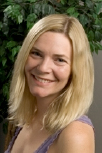by Jen Gow, North Vancouver
 As parents of deaf and hard of hearing children, we draw support from different groups of people. There are the usual suspects that all parents hope they can call on: family, friends and neighbourhood community. Our network extends beyond this though; we also look to professionals, and deaf and hard of hearing peers to educate, mentor and support us; to bring us up to speed and keep us on track in this new community we find ourselves in.
As parents of deaf and hard of hearing children, we draw support from different groups of people. There are the usual suspects that all parents hope they can call on: family, friends and neighbourhood community. Our network extends beyond this though; we also look to professionals, and deaf and hard of hearing peers to educate, mentor and support us; to bring us up to speed and keep us on track in this new community we find ourselves in.
With this in mind, it was a real treat to welcome Jenny Hatton to be our guest speaker at the Coffee Night following this year’s BC Hands & Voices AGM in March. Some of you will know Jenny in her capacity as an audiologist with the Early Hearing Program and BC Children’s Hospital. Jenny has the unusual advantage of being able to share her perspective on hearing loss from both a professional and personal level.
Jenny was diagnosed with moderate bilateral hearing loss when she was two and a half years old. Although Jenny demonstrated typical development in most areas, and there was no family history or risk factors for hearing loss, Jenny’s parents noticed that her speech production was not on par with her big sister. The family doctor declared Jenny’s hearing was fine after finger snapping behind her ears when she was one and a half years old. A long-awaited referral to an audiologist revealed the true nature of Jenny’s hearing through tests in a sound booth followed by verification with auditory brainstem response (ABR) testing.
At that time in the 1980’s, families were advised to decide on one mode of communication, sign or oral, with little support for combined approaches. It became apparent soon after being fit with hearing aids that Jenny was a hearing kinda gal! She loved her hearing aids and rapidly developed speech. A speech language pathologist visited her home, and Jenny’s parents, who were teachers, built on this foundation. After attending specialist services for preschool (Children’s Hearing and Speech Centre of BC, known as the Vancouver Oral Centre at the time) she went on to kindergarten in the mainstream elementary school where her mum taught.
Jenny learnt strategies to optimize her hearing in school, for example, classroom positioning (set-ups were more static in those days). She recognizes now that the advocacy of her parents’ paid dividends with teachers likely modifying their teaching strategies. During her school years, Jenny didn’t really perceive herself as being hard of hearing. This, combined with an independent spirit, led to Jenny’s reluctance to work with the Hearing Resource teacher, especially during high school. Her grades were good – she didn’t need help! (I’m sure this rings some bells for most of us when we reflect on our teenage years.). In high school, Jenny also became self-conscious of the technology that facilitated her hearing; although she continued to love the function of her hearing aids, she started to hide them. She also didn’t adopt using a FM system until her university years, and now realizes that there were details she was missing out on.
Jenny learnt as a young adult to embrace the hard-of-hearing aspect of her identity, no longer concealing her hearing equipment. Although this aspect of Jenny’s life has doubtless had some influence on her career choices, it was a somewhat circuitous path that led her into Audiology. After switching degree course three times, Jenny took on a research assistant position at the Human Auditory Physiology Lab (HAPLAB) for several years, where her interest in audiology grew. As an audiologist, she now provides ABR testing at BC Children’s Hospital, and supports and trains other audiologists around the province.
Jenny was happy to field questions from the fifteen parents in attendance. We covered topics ranging from deaf/hard of hearing peers and support groups, to extra-curricular activities, self-advocacy and identity, genetic testing, use of technology…
From a personal point of view, I can attest to the power of Jenny’s story. Jenny identified my daughter’s severe-profound hearing loss when she was six weeks old. At the instant of being told this news, I felt lost. What does this mean? I don’t know anybody with hearing loss. Why is this? Are they ‘hidden’ in my community? Are they so well integrated that I don’t notice? Jenny answered my questions very professionally. The nuances are lost in my memory but what will stick with me forever was Jenny telling me that she had a severe hearing loss. This young, professional woman had a hearing loss. Of course everybody’s path is varied but this detail was my starting block; it gave me the strength to stand up, walk out, drive home and tell my family what I’d just found out.
I’m sure that you’ll agree that Jenny’s story is empowering on many levels. It is nevertheless worthwhile reflecting that Jenny’s family found it difficult that her hearing loss was not identified earlier. Thankfully, this situation has become rare in BC since the initiation of the BC Early Hearing Program. Most families now have the opportunity to draw on services and supports sooner to help us figure out the best way to support our deaf and hard of hearing children. In fact, BC is now leading the way in this; it is the only province in Canada to achieve an “Excellent” Grade on Early Hearing Detection and Intervention*. Go BC, go!

